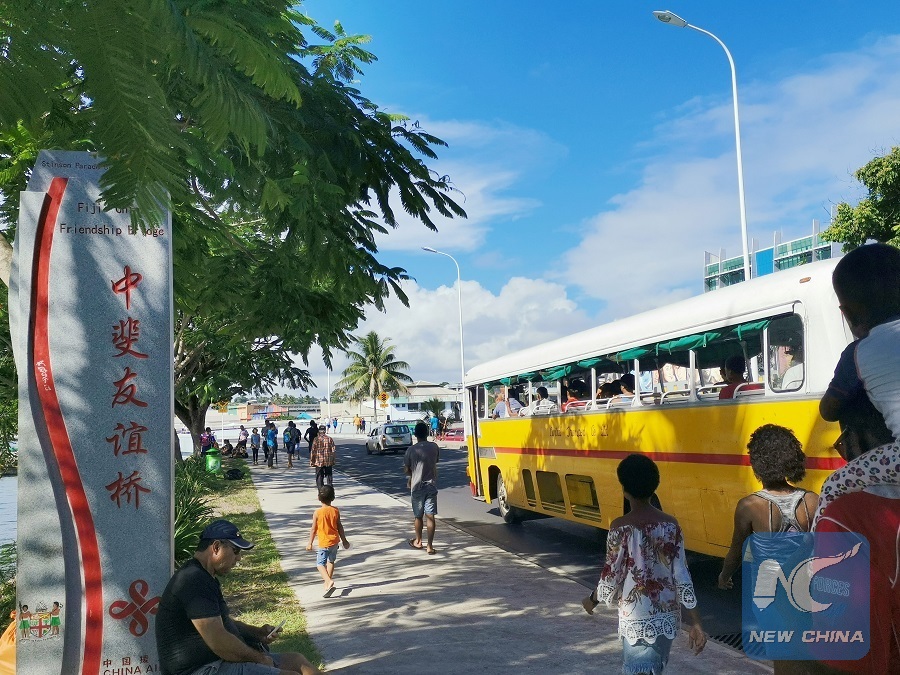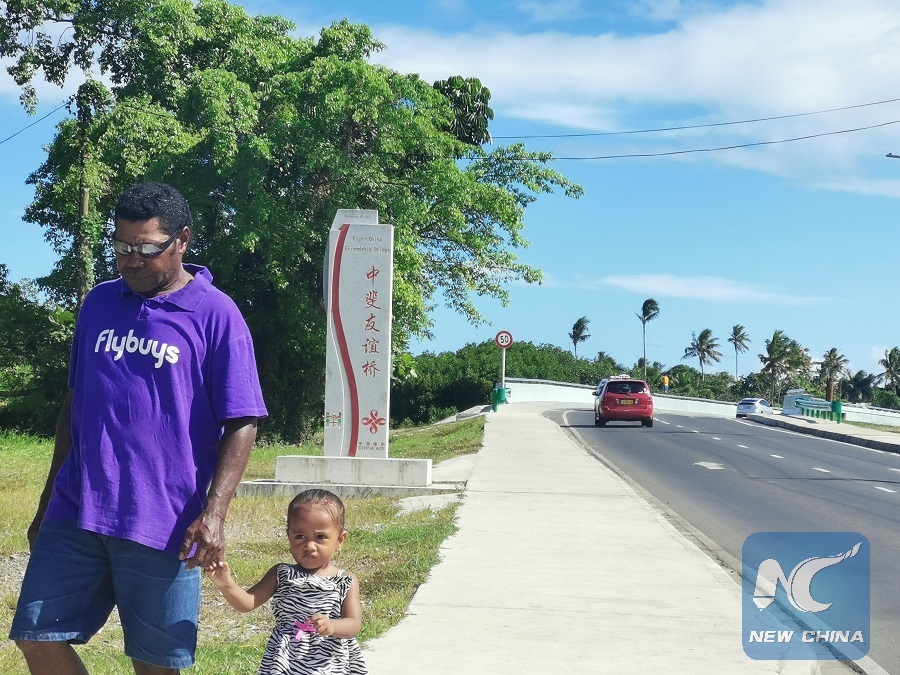
Photo taken on March 16, 2019 shows the Stinson Parade Bridge in downtown Suva, capital of Fiji. (Xinhua/Zhang Yongxing)
by Zhang Yongxing
SUVA, March 17 (Xinhua) -- China's Belt and Road Initiative (BRI) is a development dividend for participating countries, including the Pacific island countries (PICs), as it has enhanced social and economic progress of the countries and brought benefits to the people, a Fijian expert said on Sunday.
"The BRI has been welcomed by a lot of participating countries, including the Pacific island countries as it has brought social and economic development and hope to them. For Pacific island countries, they need massive infrastructure development and I think China is just doing that under the framework of BRI," Keshmeer Makun, a lecturer of the University of the South Pacific (USP) told Xinhua.
He disagreed with the so-called "debt-trap" about BRI, saying that "it is important to know that China often takes into consideration the ability to meet foreign debt obligation and solvency constraint of receiving countries, hence, preventing heavy debt burden."
"China puts no political conditions and tries to meet the needs of the aid-receiving countries. In addition, like any other project, the Chinese-funded projects also go through rigorous market research and feasibility study, so that they not only get the right costing and quality, but also bring the preferred social and economic assistance to the people," he said.
"Pacific leaders have found China's assistance more desirable. Correspondingly, China has provided large quantity of foreign aid to the Pacific island countries over the past years. It is evident that China's financial aid and projects have substantially enhanced social and economic progress of Pacific island countries and provided great benefits to the people," he said.
From his point of view, the Belt and Road Initiative was proposed by China but shared by the international community. And it is an important platform for the win-win cooperation and what the PICs really need.
"There are obviously different voices out in the world but for many Pacific island countries, I think there is only one voice. The fact is that many of the PICs lack the physical infrastructure and supply chain logistics which can help them to export in a significant way," he said.
"Considerable infrastructure investments in communications, seaports and airports are required to enhance trade and reduce the high cost of doing business and I think China's assistance through BRI to the Pacific region is helping substantially and consequently inject impetus to further cooperation through trade and investment," he said.

Photo taken on March 16, 2019 shows the Vatuwaqa Bridge in the eastern part of Suva, capital of Fiji. (Xinhua/Zhang Yongxing)
The Silk Road Economic Belt and the 21st Century Maritime Silk Road Initiative, proposed by China in 2013, aims to build a trade and infrastructure network connecting Asia with Europe and Africa along the ancient trade routes of the Silk Road.
The expert added that infrastructure deficit in many countries including the Pacific island countries that makes connectivity difficult is a serious concern. Reducing infrastructure deficit will enhance trade and business among these countries. In this respect, the China-proposed BRI is clearly providing the technology, finance and experience to contribute to less-developed countries in building needed infrastructure.
"Further, in business, infrastructure is not only the thing but also the ease with which they conduct transactions. In this respect, the thriving internet industry has enable China to shift from the credit card era to the online or mobile payment system helping the small- and medium-sized enterprises (SMEs) to do business with ease," Makun said.
"Similar digital model could be developed to enhance digital gap in other less-developed countries. The other areas of cooperation could be fighting corruption and poverty alleviation on which China has also made good quality progress."
As for China's assistance to Fiji, which inked a Memorandum of Understanding with China on cooperation within the framework of the BRI last November, Makun said China's aid to Fiji has played an important role in the island nation's economic development.
"It is not only improving the economic environment, but also enhancing the ability of being independent and reducing their dependency on imports. In addition, China's aid to Fiji is suitable to local practice while enhancing the people's living conditions, improving their living standards and increasing their incomes," he said.
In his opinion, Fiji and China, the two highly complementary economies, have great potential to cooperate through BRI.
"Fiji is economically backward but boasts rich tourist, marine, mineral and agricultural and forestry resources. And China has the advantages of capital, technology, market and human resources," he said.
Believing that BRI is inclusive, open to all countries and international and regional organizations for engagement, he said, "China has already made advances in various areas in the Pacific region and there is indeed huge potential for meaningful cooperation and technical support," Makun said.
He made it clear that the BRI has also helped the Pacific island nations attract more foreign assistance and investment by countries such as United States, Australia and New Zealand.
"Indeed, China's presence and assistance has also motivated our regional neighbors such as Australia, New Zealand and U.S. to step up. It is a good thing that such countries have made their commitments to boost the Pacific region's development," he said.

